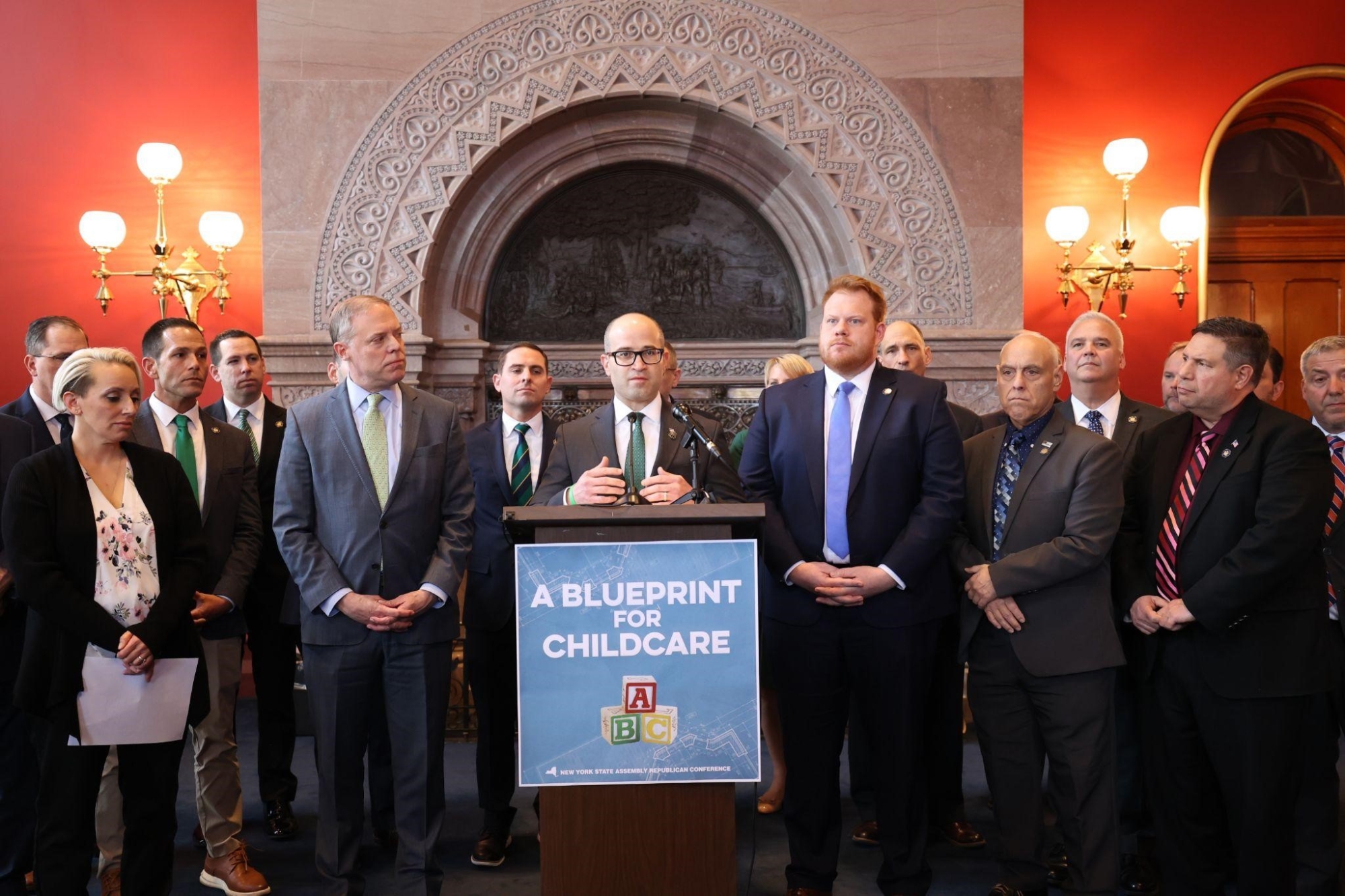Assembly Minority Propose Child Care Investment to Increase Access & Improve Affordability
Assembly Minority Leader Will Barclay (R,C-Pulaski) and his Assembly Minority colleagues today addressed serious concerns with the lack of high-quality and affordable child care throughout the state. Nearly half of all parents say their child care situation is unworkable. The Conference unveiled its “A Blueprint for Childcare (ABC) Plan,” a comprehensive proposal to provide much-needed improvements to child care costs and access through increased tax incentives for families and day cares, expansion of access to early childhood education and increasing provider options.
“Every family should have the option to choose a safe, affordable, care-centered program that will provide the best environment for their little one,” said Assembly Minority Leader Will Barclay (R-Pulaski). “This will save the average family over $2,300. At a time when the cost of living continues to rise, every dollar saved will help curb child poverty. Additionally, some parents would like to get back into the workforce but simply don’t have that capability due to high costs or a lack of quality child care. Our proposal is tailored to meet the diverse needs of every family by modernizing facilities and allocating resources to improve child care access.”
“The rising child poverty rate reflects a failure to provide adequate support and opportunities for our most vulnerable population, a pressing concern that demands urgent attention,” said Assemblyman Ed Ra (R-Franklin Square). We have the power to change this trend through targeted investments in child care. The solutions we propose—increased tax incentives, expansion of early childhood education and increasing accessibility and availability of child care—exemplify our commitment to laying a strong foundation for educational success. To build a better future for our New York families, we need to ensure our kids get the opportunities they deserve to succeed.”
Studies have shown that by providing funding directly to families and businesses, the child poverty rate is significantly reduced and access to quality child care programs becomes more readily available. The Minority’s ABC proposal would result in roughly $1 billion in savings for families currently struggling with the costs of child care. These proposals include:
Providing increased tax incentives to both providers and families:
- Increasing the Empire State child credit amount to 45% of the federal Child Tax Credit amount (A.9257-A, Ra);
- $299 million in savings.
- Creating a new Child Care Facility Capital Improvement tax credit to help child care providers enhance and update facilities (A. 9264, Ra);
- $250 million in savings.
- Calling on the federal government to reinstate the Enhanced Child Tax Credit permanently (To be introduced, Ra);
- This is to provide additional resources to reduce child poverty rates.
- Increasing the State Earned Income Tax Credit amount from 30% to 45% (A.9258, Ra);
- $386 million in savings.
Expanding Access to Early Childhood Education:
- Universal pre-kindergarten (UPK) aid increase and program improvements (A.9128, Jensen);
- Increasing state reimbursement rate to school districts for UPK students and expanding collaboration between school districts with child care agencies.
- Ensuring school districts and child care agencies follow the same regulations regarding staffing ratios and class sizes.
- Calling on the commissioner of education to streamline the hiring process for qualified UPK teachers and minimize the costs for new and existing programs.
Increasing Accessibility and Tackling Affordability:
- Increasing provider options by adopting regulations to establish a model for child care that includes hours outside of traditional day care models such as nights and weekends (A.9126, Jensen);
- Establishing a waiver to allow child care to be provided in the home to multiple families as an unlicensed and unregulated day care setting to encourage and facilitate parental choice (To be introduced, Gandolfo);
- Implementing an eligible substitute child care database for child care providers when in need of coverage or support, (A.6071, Slater);
- Instituting a regional cost factor for child care subsidies by regions across the state (To be introduced, Gandolfo);
- Conducting a new study to examine existing state barriers that prevent the new creation of providers (A.8969, Maher).

